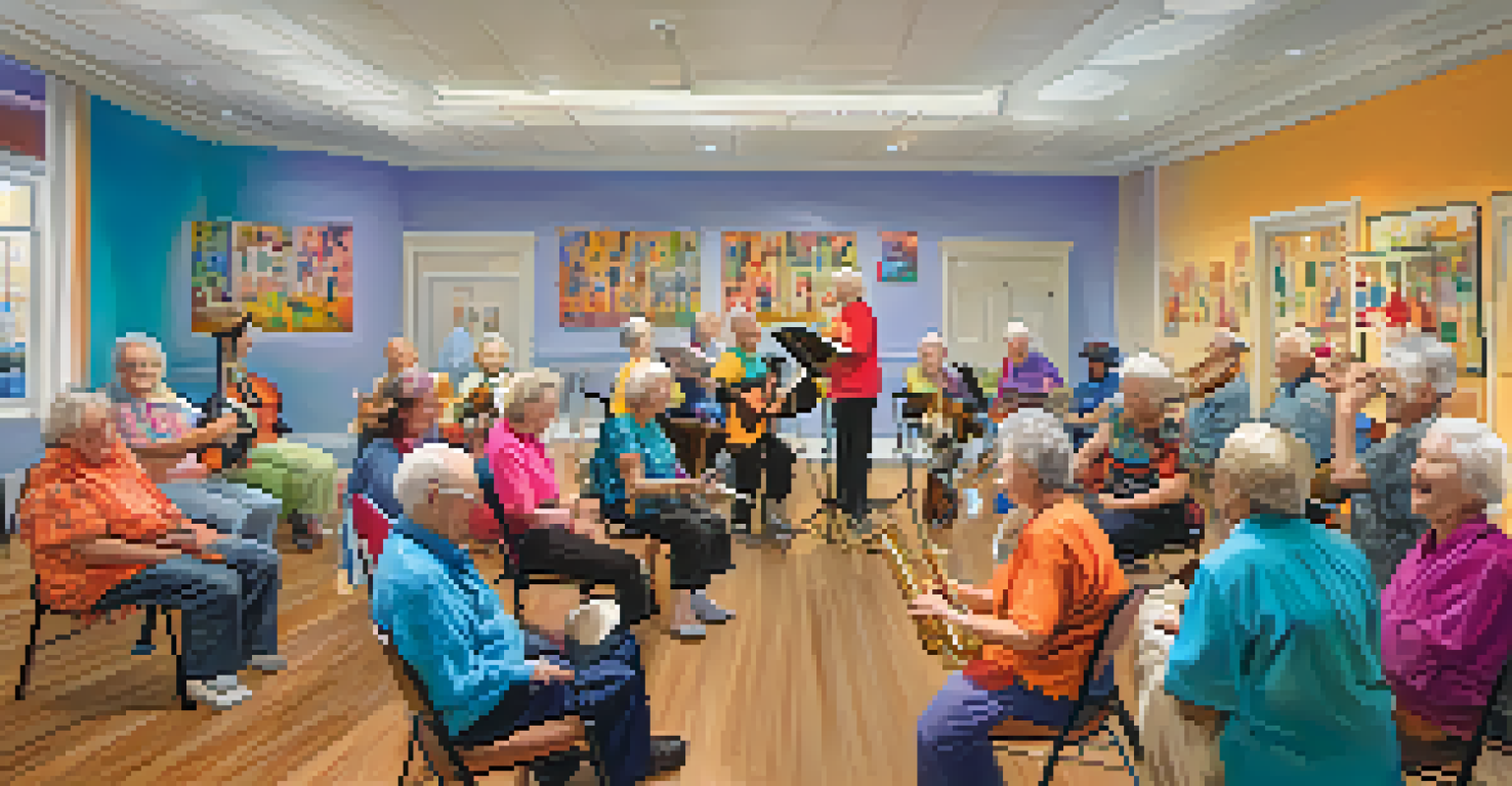Music and Memory: Benefits for the Aging Population

The Connection Between Music and Memory
Music has a unique ability to evoke memories and emotions. For many seniors, certain songs can transport them back to significant moments in their lives, often bringing vivid recollections that might otherwise remain buried. This powerful connection between music and memory is rooted in how our brains process auditory stimuli.
Music can change the world because it can change people.
Research suggests that listening to music activates various regions of the brain, including areas associated with memory recall. This is particularly beneficial for older adults experiencing cognitive decline, as music can serve as a cue to trigger memories and facilitate communication. It's like unlocking a treasure chest of nostalgia and joy.
As we age, the brain's neural pathways can degrade, making it harder to access memories. However, engaging with familiar music can help strengthen these pathways, providing a simple yet effective tool to enhance cognitive function and emotional well-being.
Music as a Tool for Cognitive Engagement
Engaging with music—whether through listening, singing, or playing an instrument—can significantly boost cognitive engagement in seniors. This kind of mental stimulation is essential for maintaining brain health and promoting lifelong learning. Just like a workout keeps our bodies fit, music can exercise our minds.

Group singing activities or music therapy sessions can foster social interaction, reducing feelings of isolation often experienced by older adults. When people come together to share music, it creates a sense of community and belonging, which is vital for mental health. Imagine the joy of singing your favorite songs with friends; it’s both uplifting and energizing.
Music Boosts Memory and Cognition
Listening to music can activate brain regions linked to memory, helping seniors recall cherished moments and enhance cognitive function.
Moreover, music can enhance concentration and attention. By incorporating music into daily routines, seniors can improve their focus during activities, whether it’s cooking, gardening, or even doing puzzles. This leads to a richer, more fulfilling life experience.
Emotional Benefits of Music for Seniors
Music is a powerful emotional outlet. For many seniors, listening to their favorite tunes can evoke feelings of happiness, nostalgia, or even comfort during tough times. It’s like having a friend by your side, ready to uplift your spirits or provide solace when needed.
The music is a world within itself, it's a world of light and a world of darkness.
Moreover, music therapy has been shown to reduce symptoms of depression and anxiety among the aging population. Participating in musical activities can foster a sense of accomplishment and joy, allowing seniors to express their emotions in healthy ways. Think of it as a natural mood booster that doesn’t come with any side effects.
When older adults connect with music that resonates with them, it can lead to improved overall emotional health. This emotional connection can significantly enhance their quality of life, making everyday moments feel more meaningful and connected.
Music and Physical Movement: A Dynamic Duo
Music isn’t just good for the brain; it’s also beneficial for the body. Many seniors find that rhythmic tunes inspire them to move, whether through dancing, walking, or even gentle exercises. This link between music and movement can lead to improved physical health and mobility.
Participating in dance classes or group exercises set to music can enhance coordination and balance, reducing the risk of falls. It’s a fun, energetic way to stay active while also fostering social connections with others. Just picture a lively dance floor filled with laughter and joy—it's a win-win situation.
Emotional Well-being Through Music
Music serves as a powerful emotional outlet, reducing feelings of depression and anxiety while fostering joy and connection among seniors.
Furthermore, music can serve as a motivational tool during physical activity. The right playlist can make exercise feel less like a chore and more like an enjoyable experience. As the beat drops, so does the reluctance to move, turning exercise into a delightful activity.
Music Therapy: A Proven Approach for Seniors
Music therapy is a structured approach that utilizes music to address various therapeutic goals. For seniors, this can include improving memory, enhancing communication skills, and fostering emotional well-being. Certified music therapists tailor sessions to meet individual needs, making it a personalized experience.
In sessions, seniors might engage in singing, songwriting, or even improvisation, allowing them to express themselves creatively. This creative outlet can be particularly liberating, providing a sense of agency and empowerment. It’s like unlocking a hidden talent or rediscovering a long-lost passion.
Numerous studies have shown that music therapy can lead to significant improvements in cognitive and emotional functioning for older adults. By integrating music into their care plans, families and caregivers can help seniors experience a higher quality of life.
Creating a Music Routine for Seniors
Establishing a music routine can be a delightful way for seniors to incorporate music into their daily lives. Whether it’s starting the day with an uplifting playlist or enjoying a soothing evening concert, creating a musical atmosphere can enhance their overall well-being. Think of it as adding a splash of color to a blank canvas.
Family members can help by curating playlists that resonate with their loved ones, including songs from their youth or favorite genres. This not only fosters connection but also sparks conversations about memories tied to specific songs. Sharing stories can reinforce relationships and deepen bonds.
Physical Movement Inspired by Music
Engaging with rhythmic tunes encourages physical movement, improving coordination and balance while making exercise enjoyable for seniors.
Additionally, participating in community music events or joining local choirs can provide social opportunities and a sense of belonging. Incorporating music into life doesn’t require a grand overture; even small, consistent practices can make a profound difference.
The Future of Music and Memory in Aging
As research continues to unfold, the future of music and memory in the aging population looks promising. Advancements in technology, such as music apps and online platforms, are making it easier than ever for seniors to access their favorite tunes. It's like having a personal DJ at their fingertips.
Moreover, ongoing studies are likely to uncover even more benefits of music for cognitive health. With the aging population on the rise, understanding how music can play a role in enhancing quality of life becomes increasingly essential. Imagine a world where every senior has access to the healing power of music.

Ultimately, as we embrace the intersections of music and memory, we can create a more supportive environment for our aging loved ones. By recognizing the profound impact music can have, we can foster connections that enrich their lives, one note at a time.